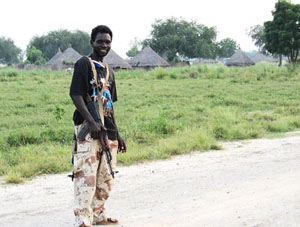
Last year saw a sharp increase in the number of lives lost in southern Sudan due to “inter-tribal violence” that affected communities across the South. This year, clashes have continued, but a new trend is evident in violence in Lakes state, a remote area of the South largely populated by sub-clans of the Dinka ethnic group.
The recent violence in Lakes is related to an ongoing civilian disarmament campaign being conducted by the southern army, or SPLA. According to Enough correspondence with SPLA spokesperson Kuol Deim Kuol, the Government of Southern Sudan has instructed the SPLA to systematically confiscate weapons from civilians in the 10 states of southern Sudan. Disarmament is currently underway in seven of the ten states. (According to the SPLA, campaigns have not begun in the three states – Western Bahr El Ghazal, Western Equatoria, and Eastern Equatoria – where the Lord’s Resistance Army currently threatens civilian populations.)
Several major disarmament campaigns in the South since the 2005 signing of the Comprehensive Peace Agreement have gone badly. More than a thousand people were killed in a 2006 campaign in volatile Jonglei state. Major human rights violations regularly occur when the SPLA forcibly attempts to remove weapons from the hands of civilians who fear leaving their security up to an army who they perceive as either incapable or unwilling to protect them.
The latest example of the failures of disarmament in the South occurred this week in Cueibet County in Lakes state, where civilians reportedly attempted to break into a weapons storage facility to retrieve arms that were taken from them in a disarmament campaign. This incident underscores a basic reality of disarmament attempts in the South: If local populations are not convinced that their security will be guaranteed by their government and its army, they will find a way to hold on to – or recapture – their weapons in order to protect themselves.
In Akot, a town southeast of the Lakes state capital of Rumbek, tensions between a SPLA battalion stationed in the town and the local population erupted into a series of clashes that resulted in the deaths of 17 soldiers and 7 civilians and displaced the town’s entire population (an estimated 3,000 people). Although it is unclear the cause of the Akot clashes, an ongoing disarmament campaign in the state – combined with the history of brutal and deadly SPLA efforts to forcibly disarm local populations in the state – means that underlying tensions between the army and local populations are more likely to spark into serious incidents.
As Sudan’s elections approach, poor relations between the army and local populations through the South (see my colleague Ledio Cakaj’s report on civilian protection failures in Western Equatoria state) could worsen an already tense situation during the polls. One thing is for sure: As Oxfam and other humanitarian NGOs working in the South noted in a recent report, the Government of Southern Sudan needs to “move beyond disarmament” and devise better strategies for improving long-term community security.

